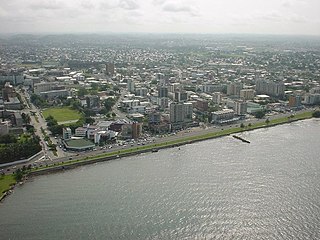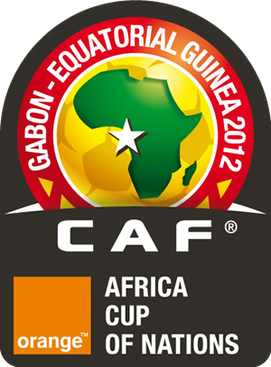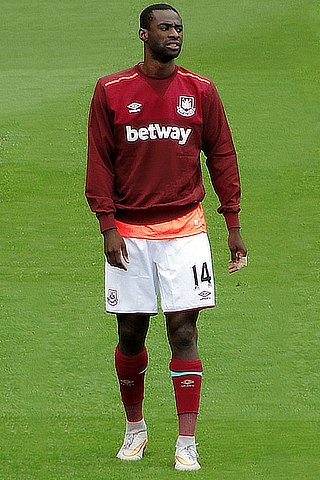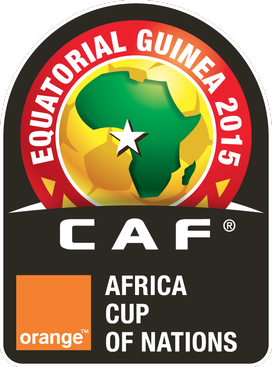
Libreville is the capital and largest city of Gabon, located on the Gabon Estuary. Libreville occupies 65 square kilometres (25 sq mi) of the northwestern province of Estuaire. Libreville is also a port on the Gabon Estuary, near the Gulf of Guinea. As of the 2013 census, its population was 703,904.

The Tunisia national football team, represented Tunisia in association football since their inception in 1957. Controlled by the Tunisian Football Federation (TFF), the governing body of football in Tunisia. The squad is governed by the Confederation of African Football (CAF) continentally, and FIFA worldwide. The team is also part of the North African Union and the Arab Union. While Tunisia qualify for the FIFA World Cup six times, they have qualified 21 times to the Africa Cup of Nations and and participated in four editions of the Olympic football tournaments. Colloquially known as the Eagles of Carthage by fans and media and the bald eagle is its symbol. Their home kit is primarily red and their away kit white, a reference to their national flag. Tunisia's main venue is the Hammadi Agrebi Stadium in Radès, Tunis since 2001. Tunisian coach Faouzi Benzarti training the team since 1 July 2024.

The Ivory Coast national football team represents Ivory Coast in men's international football. Nicknamed the Elephants, the team is managed by the Ivorian Football Federation (FIF). The team has won the Africa Cup of Nations three times, in 1992, 2015 and 2024, and has qualified for the FIFA World Cup three times, in 2006, 2010, and 2014.
The Zambia national football team represents Zambia in association football and is governed by the Football Association of Zambia (FAZ). During the 1980s, they were known as the KK 11, after founding president Dr. Kenneth Kaunda ("KK") who ruled Zambia from 1964 to 1991. After the country adopted multiparty politics, the side was nicknamed Chipolopolo which means the "Copper Bullets". The team won an Africa Cup of Nations title in 2012. This team has also become the most successful team in the COSAFA Cup, surpassing Zimbabwe after winning the 2023 edition.
The Gabon national football team represents Gabon in men's international football. The team's nickname is The Panthers and it is governed by the Gabonese Football Federation. They have never qualified for the FIFA World Cup, but have qualified eight times for the Africa Cup of Nations. Gabon is a member of both FIFA and Confederation of African Football (CAF).

The Gambia national football team represents the Gambia in men's international football and is controlled by the Gambia Football Federation. Until 1965, the team and the country were known as British Gambia. The team has never qualified for the World Cup. In 2021, Gambia qualified for the Africa Cup of Nations finals for the first time in history. The team represents both FIFA and Confederation of African Football (CAF).

The Mauritania national football team, nicknamed Al-Murabitun in the reference to Almoravid dynasty, represents Mauritania in men's international football. It is controlled by the Féderation de Football de la République Islamique de Mauritanie, and is a member of the Confederation of African Football. They have not qualified for the FIFA World Cup. However, in the Amílcar Cabral Cup, a regional tournament for West Africa, Mauritania came fourth in 1980 on hosting the competition. The national football team of Mauritania later runners-up in 1995, losing on penalties to Sierra Leone after the final finished 0–0.
The Niger national football team represents Niger in international football through the Nigerien Football Federation, a member of Confederation of African Football (CAF). Niger plays in the colors of the flag of Niger, white, green and orange. Their nickname comes from the Dama gazelle, native to Niger, the Hausa name of which is Meyna or Ménas The Dama appears on their badge in the colors of the national flag.

The Central African Republic national football team, nicknamed Les Fauves, is the national team of the Central African Republic and is controlled by the Central African Football Federation. They are a member of CAF. Despite being traditionally one of the weakest teams in Africa and the world, they recently achieved success. They won the 2009 CEMAC Cup by beating Gabon in the semi-finals and Equatorial Guinea in the final 3–0. Their FIFA ranking rose from 202nd in August 2010 to 89th by July 2011. On 10 October 2010, they earned a shock 2012 Africa Cup of Nations qualifier win at home against Algeria 2–0, which put them top of their qualification group. The team won its first FIFA World Cup qualifier on 2 June 2012 after beating Botswana 2–0 at home.
The Equatorial Guinea national football team represents Equatorial Guinea in men's international football and is controlled by the Equatoguinean Football Federation, a member of the Confederation of African Football (CAF).
Henri Arnaud Antchouet Rebienot, known as Antchouet, is a Gabonese former footballer who last played the for French club FC Gobelins.

The 2012 Africa Cup of Nations, also known as the Orange Africa Cup of Nations for sponsorship reasons, was the 28th edition of the Africa Cup of Nations, the football championship of Africa organized by the Confederation of African Football (CAF).
Théodore Zué Nguema was a professional football player and manager. He played as a striker. Born in Equatorial Guinea, he played for the Gabon national team between 1995 and 2005, scoring 23 goals in 77 appearances.

Pedro Mba Obiang Avomo is a professional footballer who plays as a midfielder for Serie B club Sassuolo and the Equatorial Guinea national team.

The 2015 Africa Cup of Nations, known as the Orange Africa Cup of Nations, Equatorial Guinea 2015 for sponsorship reasons, was the 30th staging of the Africa Cup of Nations, the international men's football championship of Africa. It was organized by the Confederation of African Football (CAF) and was held from 17 January to 8 February 2015.

The 2017 Africa Cup of Nations, known as the Total2017 Africa Cup of Nations for sponsorship reasons, was the 31st edition of the Africa Cup of Nations, the biennial international men's football championship of Africa organized by the Confederation of African Football (CAF). The tournament was scheduled to be hosted by Libya, until CAF rescinded its hosting rights in August 2014 due to the Second Libyan civil war. The tournament was instead hosted by Gabon. This event was also part of the Africa Cup of Nations 60th Anniversary.
The 2018 African Nations Championship qualification was a men's football competition which decided the participating teams of the 2018 African Nations Championship. Only national team players who were playing in their country's own domestic league were eligible to compete in the tournament.

The 2017 Africa Cup of Nations final was an association football match to determine the winner of the 2017 Africa Cup of Nations, organised by the Confederation of African Football (CAF). The match was held at the Stade de l'Amitié in Libreville, Gabon, on 5 February 2017 and was contested by Cameroon and Egypt. The sixteen teams who had qualified for the tournament were divided into four groups of four, with the top two from each group progressing to the knock-out phase. Cameroon finished as runners-up in Group A before defeating Senegal and Ghana in the quarter-final and semi-final, while Egypt reached for the final by first winning Group D and then beating Morocco and Burkina Faso.
This article lists the results of the Morocco national football team from 1990 to 2019.











